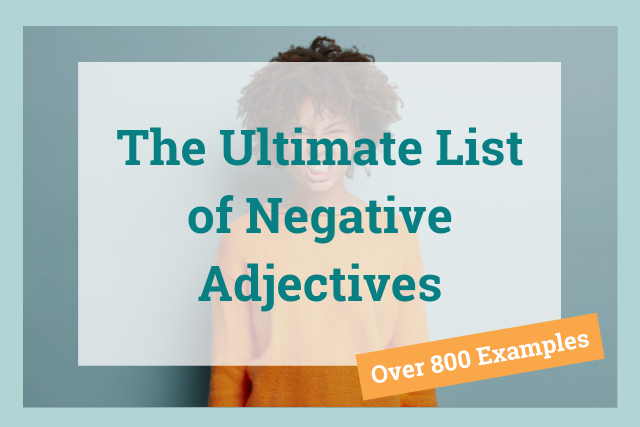
How to Add Negativity to Your Nouns
An adjective is a word that describes a noun. Use adjectives to enhance comprehension of a person, place, or thing to add emotional wallop. Used as a technique, adjectives add specificity and emotional charge to your writing.
In fiction, an emotional connection with your reader ignites a bond that makes them care about your story. In non-fiction, adjectives help you to set the tone of your writing and help your reader understand why what you are saying matters.
Adjectives are the perfect tool to add feelings to your writing. They add a sensory element to whatever noun they describe. One adjective can color a noun to elicit a neutral, positive, or negative feeling about the person, place, or thing it describes.
What Is a Negative Adjective?
Every adjective adds a dimension to the noun it describes. Negative adjectives work to connote bad feelings about the noun. They express criticism or pessimism regarding the noun described. When you are writing, they can enhance character understanding, set the story’s mood, create tone, and color setting. A noun without a descriptive adjective can be bland. One negative adjective adds tonality and resonance.
Negative Adjectives to Describe People
Here’s how a negative adjective works to describe a person.
- A man burst through the door.
Add the negative adjective:
- A disheveled man burst through the door.
Just one word, and you have feelings about that man, and they’re not good. You build apprehension in your reader. What is he going to do? Why is he disheveled? What is going on outside the door? All those questions arise from one additional word. That’s the power of adjectives.
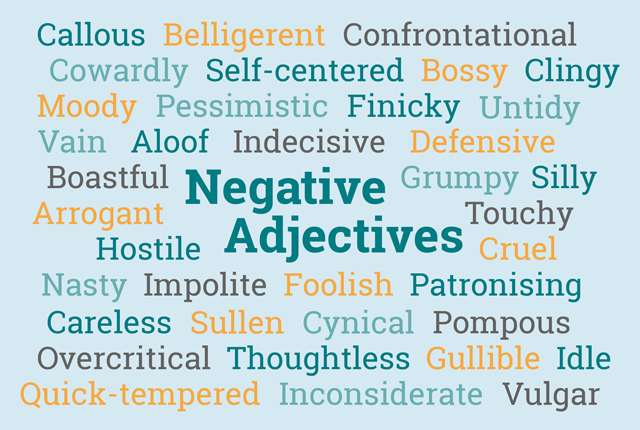
Adjectives for Negative Personality Traits
Fiction writers and screenplay writers mainly want to show a character’s traits through action. But sometimes a negative personality adjective or two helps to define a character when they are introduced.
Here’s a sample list of negative personality adjectives for character introduction and description:
| Aloof Arrogant Belligerent Big-headed Boastful Bossy Callous Careless Clingy Confrontational Cowardly Cruel Cynical |
Defensive Finicky Foolish Grumpy Gullible Hostile Idle Impolite Inconsiderate Indecisive Irresponsible Moody Nasty |
Overcritical Overemotional Patronizing Pessimistic Pompous Self-centered Silly Sullen Thoughtless Touchy Untidy Vain Weak-willed |
|---|
Negative Adjectives to Describe Places
It’s fairly easy to understand how negative traits evoke responses about people, but what about places? They work in a similar way, telling your reader how a place feels, or should make them feel. Your character’s feelings about a place set the mood for your reader. So, negative adjectives are powerful tools to set tone and mood in setting.
- Jeff looked up at Colson’s office complex surrounded by mini-malls and apartment blocks.
Just one negative adjective will give the reader a sense of Jeff’s feelings about the complex.
- Jeff looked up at Colson’s arrogant office complex surrounded by mini-malls and apartment blocks.
Now the reader has a sense of what the building feels like, at least to Jeff. And, they’ll form an image of a modern building that stands out from the plain surroundings.
Negative Adjectives to Describe Things
It doesn’t take much living to feel as though a thing—your stove, the corner post of your bed, the computer—is out to get you. You can reflect those bad feelings using negative adjectives with things. You may have applied this principle when you stubbed your toe.
- Linda looked at the pot, but after soaking and scrubbing, it was still the same.
One negative adjective.
- Linda looked at the disgusting pot, but after soaking and scrubbing, it was still the same.
Use negative adjectives in fiction to portray a character’s sentiment about the thing. This technique ties the character to their surroundings and reveals a character trait.
How Many Adjectives Should I Use for One Noun?
If one’s good, two should be twice as good, right? That’s not always the case with adjectives. When you use two adjectives that have the same meaning your writing can feel bloated. That makes the writing hard to read.
Let’s rewrite the disheveled man with more adjectives.
- A filthy, disheveled, unkempt man burst through the door.
You could use one adjective to give your reader a sense of the man’s appearance. All those adjectives strung together make your writing redundant. Redundancy means you are saying the same thing more than once.
In fact, writing with multiple adjectives used with one noun makes your writing more difficult to read. A quick way to excise redundancies is to pay close attention to implied meaning.
If you have a tendency to use multiple adjectives, ProWritingAid's Clichés and Redundancies Report identifies your overused words and makes suggestions for changes. You want your writing to be concise.
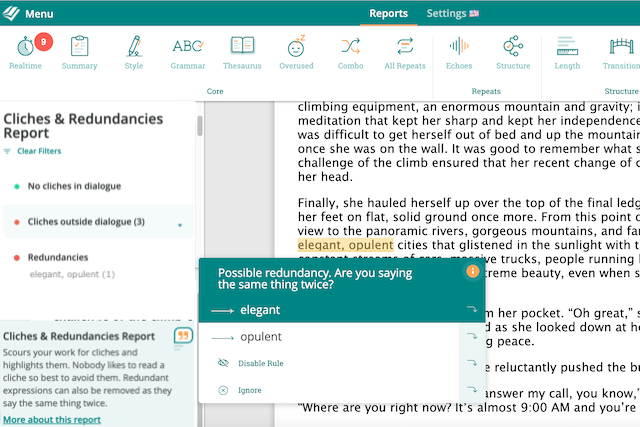
Guidelines If You Use Multiple Adjectives
In other languages, adjectives can come before or after a noun. In the English language, adjectives normally come before the noun. Commas separate multiple adjectives.
- Home was always a dark, unwelcome place.
When more than one adjective occurs after a verb such as to be, the word and connects the penultimate adjective to the last:
- Home was always a dark, unwelcome place. Now it is terrifying, sad, and cold.
The conjunction and is used before a noun when using two or more adjectives of the same type, or when adjectives refer to different parts of the same thing.
- It was a gray and black cotton shirt.
If you want to emphasize one trait over another for the same noun, put the emphatic adjective first. For example, if you want to emphasize color you could write:
- The black, jagged fighting knife
But if you want to emphasize shape, you would write:
- The jagged, black fighting knife
You may not consciously know adjective placement order, but native speakers place multiple adjectives in a specific order. The sequence goes: quantity or number, quality or opinion, size, age, shape, color, proper adjective (nationality, place of origin or material), purpose, or qualifier.
The online Cambridge dictionary establishes a sequence for adjectives if you do not use a preferred order for emphasis.
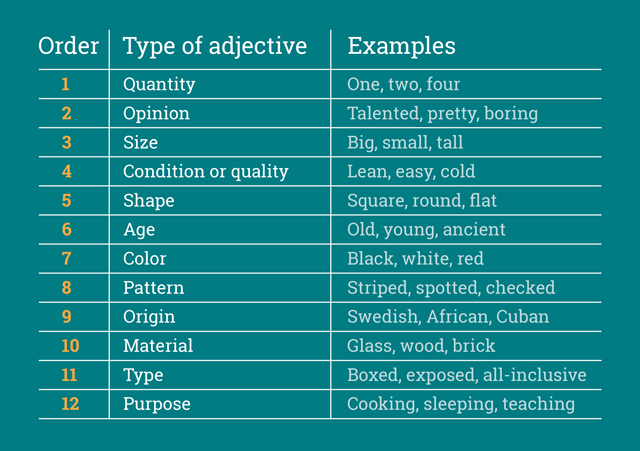
Negative Adjective Examples by Type
Opinion: unusual, ugly, repulsive
Size: monstrous, gargantuan
Condition: broken, useless, rough, untidy, jagged
Shape: square, hexagonal, boxy
Age: ancient, juvenile, menopausal
Color: rusty, drab
Pattern: garish
Multiple Adjectives Sequence Examples
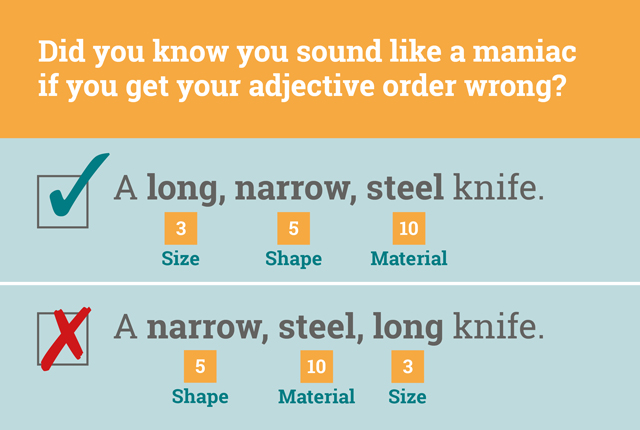
Negative Adjectives in Non-Fiction
Adjectives are descriptive words you can use in all types of writing. People often think of them as describing unpleasant characters in fiction, but they also work in non-fiction essays, articles, and manuscripts.
Non-fiction may be written with either objectively or subjectively. In an objective non-fiction, use detailed facts to present your material, minimizing use of emotionally charged adjectives. With subjective non-fiction, you have more leeway to incorporate adjectives, including negative adjectives. The most appropriate places to include negative adjectives would be in the opinion and conclusion sections.
Example of non-fiction negative adjective use:
- Some learners are strong readers and find they learn more by reading than listening in a class. Others will find the reading text tedious and lose focus.
The Ultimate List of Negative Adjectives to Describe
Now that you understand how to use negative adjectives in your writing, dive into our ultimate list of negative adjectives to find the perfect word to describe your person, place, or thing.
Negative Adjectives that Start with A
| Abhorrent Abject Abnormal Abrasive Abrupt Absent Absentminded Absurd Abusive Abysmal Accidental Acerbic Aching |
Acrimonious Adversarial Afraid Aggravating Aggressive Agonizing Aimless Alarming Aloof Anemic Angry Annoying Antagonistic |
Antiquated Appalling Apprehensive Argumentative Arrogant Artificial Artless Ashamed Astringent Atrocious Awful Awkward |
|---|
Negative Adjectives that Start with B
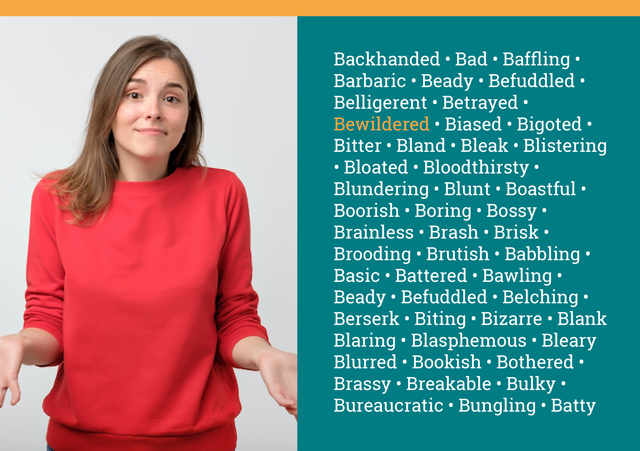
| Babbling Backhanded Bacterial Bad Baffled Baffling Barbaric Barbarous Barren Basic Battered Batty Bawling Beady Befuddled Belching Belligerent Berserk Betrayed Bewildered Bewitched Biased Bigoted |
Biting Bitter Bizarre Blamable Bland Blank Blaring Blasphemous Bleak Bleary Blind Blistering Bloated Bloodied Bloodthirsty Bloody Blue Blundering Blunt Blurred Blurry Boastful Bookish |
Boorish Bored Boring Bossy Bothered Brainless Brash Brassy Breakable Bribable Brisk Bristly Broken Brooding Bruised Brutal Brutish Bulky Bumpy Bungling Bureaucratic Busiest |
|---|
Negative Adjectives that Start with C
| Caged Cagey Callous Cancelled Cancerous Cantankerous Capricious Captive Careless Carsick Catastrophic Catatonic Caustic Cavalier Certifiable Challenged Challenging Chauvinistic Cheap Cheerless Chemical Chicken Childish Chilling Chilly Choking Choppy Chubby Chunky Clammy Clamoring Clashing Clingy Clinical Cliquish Clogged Cloistered Clownish Clueless Clumsy Cluttered Coarse |
Cocky Coercive Cold Coldhearted Colorless Combative Commercial Common Complacent Complaining Complicated Compulsive Compulsory Conceited Concerning Condemned Condescending Conditional Conflicted Conflicting Confounded Confused Confusing Congested Conspicuous Constrictive Contagious Contemptible Contemptuous Contradicting Contradictory Contrarian Contrary Controllable Controlling Controversial Convoluted Cornered Corny Corporate Corrosive Corrupt |
Corrupting Corruptive Costly Cowardly Cowering Coy Crabby Cracked Crafty Crammed Cramped Cranky Crass Craven Crazy Creaky Creeping Creepy Crestfallen Criminal Crippling Critical Crooked Cross Crotchety Crowded Crude Cruel Crumbling Crumbly Crumply Crushable Crushed Crusty Crying Cryptic Culpable Cumbersome Cursed Curt Cutting Cynical |
|---|
Negative Adjectives that Start with D
| Daffy Daft Damaged Damaging Damp Dangerous Dark Daunting Dawdling Dazed Deadly Deafening Decayed Decaying Deceitful Deceivable Deceiving Deceptive Decimated Decipherable Declining Decrepit Defeated Defective Defenseless Defensive Defiant Deficient Deformed Degenerative Degraded Dejected Delinquent Delirious Deluded Demanding Demented Demonic Deniable Dense Dependent Deplorable Depraved Depressed Depressing Depressive Deprived Deranged Derivative Derogative Derogatory Deserted Desolate Despairing Desperate |
Despicable Despised Despondent Destroyed Destructive Detached Detestable Detrimental Devastated Devastating Devious Diabolical Difficult Digressive Dilapidated Dim Diminishing Diminutive Dingy Dire Dirty Disadvantaged Disadvantageous Disaffected Disagreeable Disappearing Disappointed Disappointing Disapproving Disastrous Discarded Disconnected Discontented Discordant Discouraged Discouraging Discourteous Discredited Discreet Discriminatory Disdainful Diseased Disenchanted Disgraceful Disgruntled Disgusted Disgusting Disheartened Disheartening Dishonest Dishonorable Disillusioned Disinclined Disingenuous Disinterested |
Disjointed Dislikeable Disliked Disloyal Dismal Dismissive Disobedient Disorderly Disorganized Disparaging Dispassionate Dispensable Displeased Displeasing Disposable Disproportionate Disproved Disputed Disreputable Disrespectful Disruptive Dissatisfied Dissimilar Distant Distasteful Distracted Distraught Distressed Distressing Distrustful Disturbed Disturbing Divided Divisive Dizzy Domineering Doubtful Doubting Dowdy Down Drab Drained Dramatic Drastic Dreaded Dreadful Dreary Dripping Droll Drooping Droopy Drowsy Drunk Dry |
|---|
Negative Adjectives that Start with E
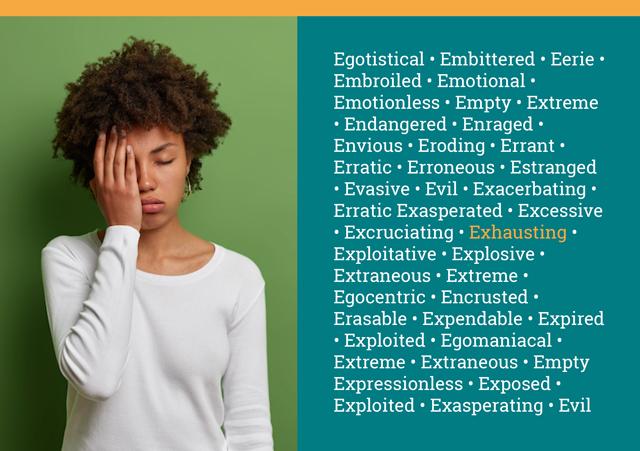
| Eerie Egocentric Egomaniacal Egotistical Emaciated Embarrassed Embarrassing Embittered Embroiled Emotional Emotionless Empty Encrusted |
Endangered Enraged Envious Erasable Eroding Errant Erratic Erroneous Estranged Evasive Evil Exacerbating Exasperated |
Exasperating Excessive Excruciating Exhausting Expendable Expired Exploitative Exploited Explosive Exposed Expressionless Extraneous Extreme |
|---|
Negative Adjectives that Start with F
| Facetious Faded Failed Faint Faithless Fallacious Falsified Faltering Famished Fanatical Fatal Fatigued Faulty Fawning Feared Fearful Fearsome Feckless Feeble Feeble-minded Feigned Felonious Fetid Feverish Fidgeting Fidgety Fiendish Filmy |
Filtered Filthy Finicky Fishy Flaky Flat Flavorless Flawed Fleeting Flimsy Flippant Floppy Foggy Foolhardy Foolish Forbidding Forceful Foreboding Forgetful Forgettable Forgotten Formulaic Foul Fractious Fragile Fragmented Frail Frantic |
Fraudulent Frayed Freakish Freaky Freezing Fretful Fried Frightened Frightening Frightful Frigid Frilly Frivolous Frosty Frowning Frozen Frugal Fruitless Frumpy Frustrated Frustrating Fumbling Fuming Furious Furtive Fussy Futile Fuzzy |
|---|
Negative Adjectives that Start with G
| Gabby Galling Gangly Gaping Garbled Garish Garrulous Gasping Gaudy Gaunt Gawky Generic Ghastly Ghoulish Glassy Glib |
Gloomy Glum Gluttonous Gnarly Goofy Grainy Grating Grave Greasy Greedy Green Grim Grimacing Grimy Gritty Groaning |
Groggy Gross Grotesque Grouchy Growling Grubby Grueling Gruesome Gruff Grumbling Grumpy Guarded Guilty Gullible |
|---|
Negative Adjectives that Start with H
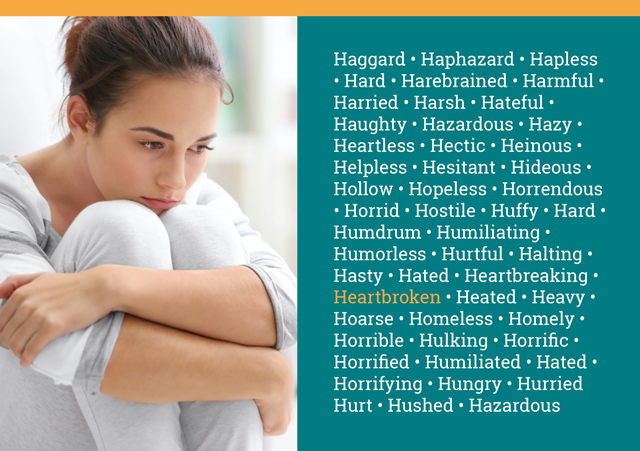
| Haggard Halting Haphazard Hapless Hard Harebrained Harmful Harried Harsh Hasty Hated Hateful Haughty Hazardous Hazy Heartbreaking Heartbroken |
Heartless Heated Heavy Hectic Heinous Helpless Hesitant Hideous Hoarse Hollow Homeless Homely Hopeless Hormonal Horrendous Horrible Horrid |
Horrific Horrified Horrifying Hostile Huffy Hulking Humdrum Humiliated Humiliating Humorless Hungry Hurried Hurt Hurtful Hushed |
|---|
Negative Adjectives that Start with I
| Icky Iconoclastic Icy Idiotic Ignorable Ignorant Ill Illegal Illegible Illegitimate Illicit Illiterate Illogical Immature Immodest Immoral Impatient Imperfect Imperial Impersonal Impertinent Impetuous Impolite Imposing Impossible Impoverished |
Impractical Imprecise Improper Imprudent Impulsive Impure Inaccessible Inaccurate Inactive Inadequate Inadmissible Inadvisable Inane Inappropriate Inarticulate Inattentive Inauspicious Incapable Incessant Incoherent Incompatible Incompetent Incomplete Incomprehensible Inconceivable Inconclusive |
Incongruent Inconsequential Inconsiderate Inconsistent Inconsolable Inconvenient Incorrect Indecent Indecipherable Indecisive Indifferent Indignant Indiscriminate Inefficient Infantile Inferior Infuriating Inhospitable Insane Insincere Insipid Irksome Irrational |
|---|
Negative Adjectives that Start with J, L
| Jaded Jeering Judgmental |
Lame Laughable Lecherous |
Leering Loathsome Lowly |
|---|
Negative Adjectives that Start with M, N
| Malevolent Malignant Manipulative Melodramatic |
Messy Moody Muddled Myopic |
Narcissistic Negligent Nosy |
|---|
Negative Adjectives that Start with O, P, Q
| Obscene Obstinate Odd Opportunistic Oppressive Parasitic |
Pathological Pedantic Pessimistic Petty Petulant Pitiful |
Predictable Prejudiced Putrid Querulous |
|---|
Negative Adjectives that Start with R, S
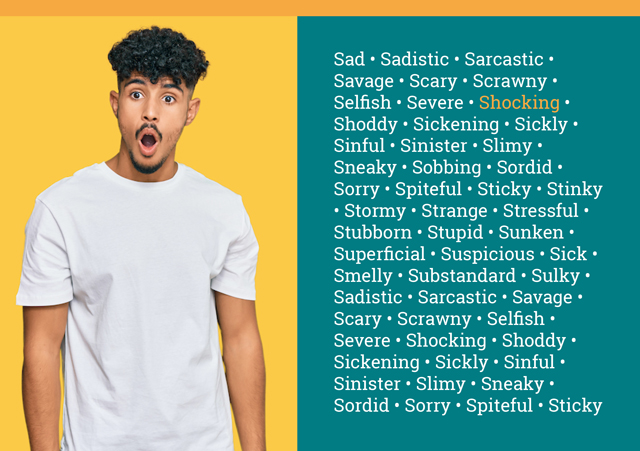
| Racist Redundant Reprehensible Repugnant |
Rude Sanctimonious Sickening Smothering |
Smug Squalid |
|---|
Negative Adjectives that Start with T, U, V, W, Y
| Tacky Tasteless Temperamental Thoughtless |
Timid Toxic Tyrannical Upsetting |
Vacuous Wasteful Wretched Yellow |
|---|
Adjectives Evoke Emotions
Negative adjectives have the power to color nouns, bringing them to life by evoking an emotional response. When you use negative adjectives, readers will respond emotionally, understanding the disgust, fear, repulsion, disdain, and disagreement.
Understand the meaning of the adjectives you use to call out the specific emotions you want from your readers. The right, strong negative adjective is more powerful than a string of adjectives. One good word adds punch to your writing. Choose well to create the feeling you want your reader to feel.


